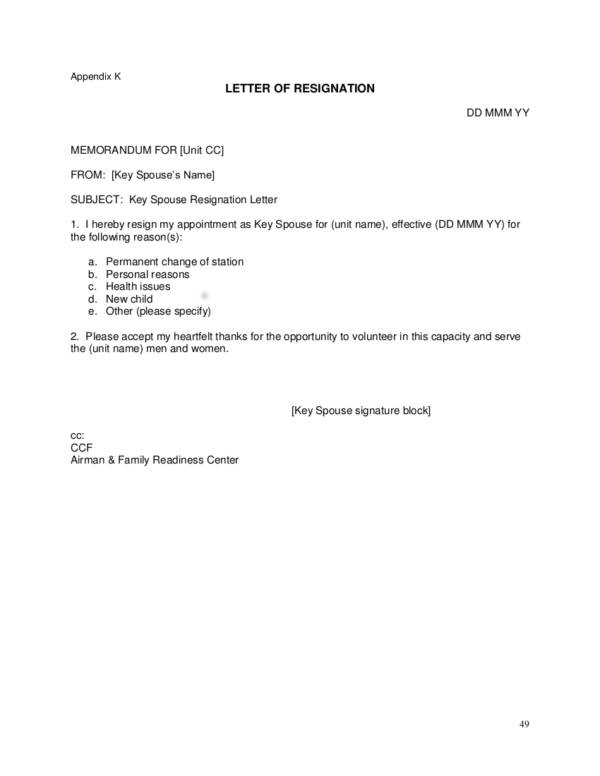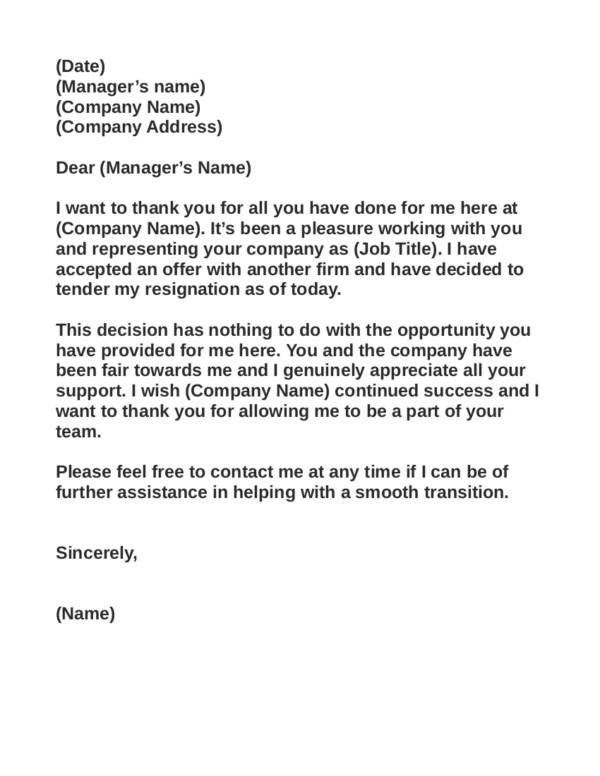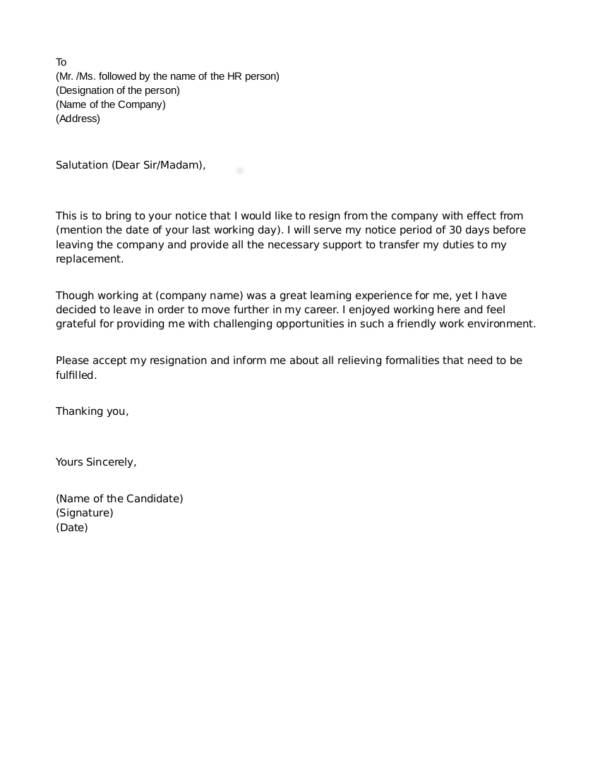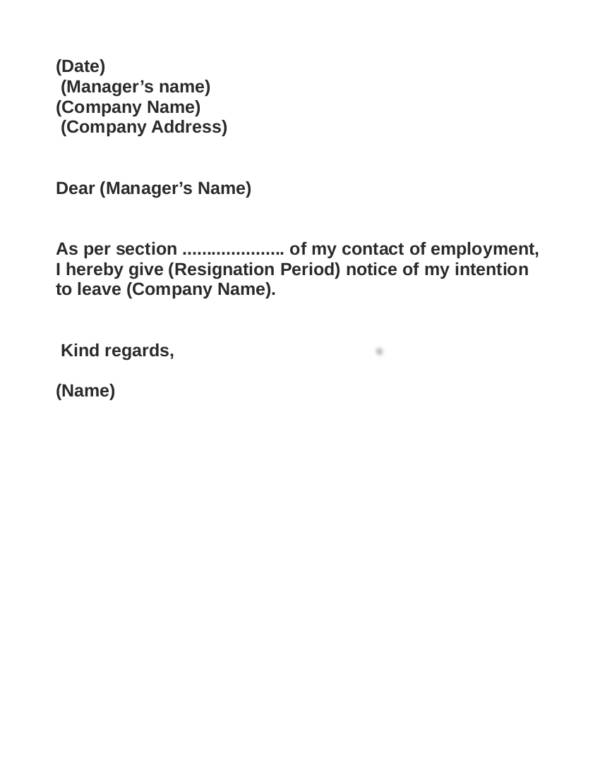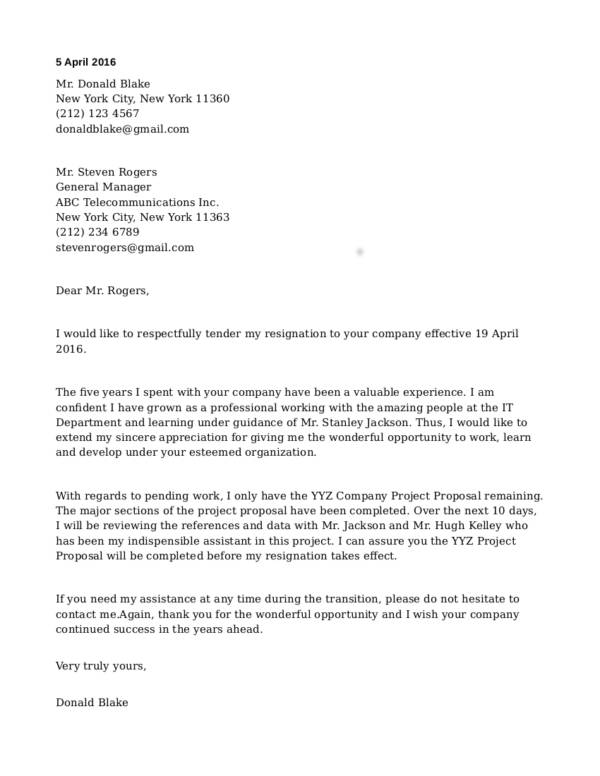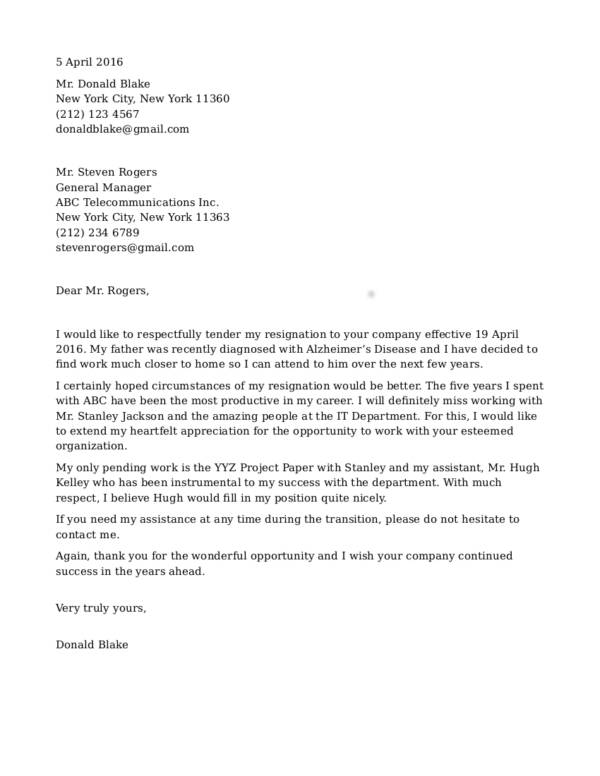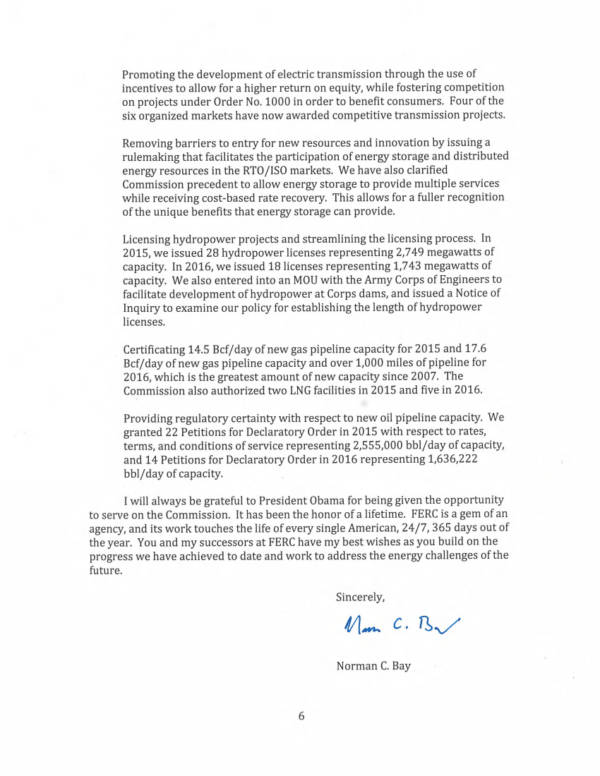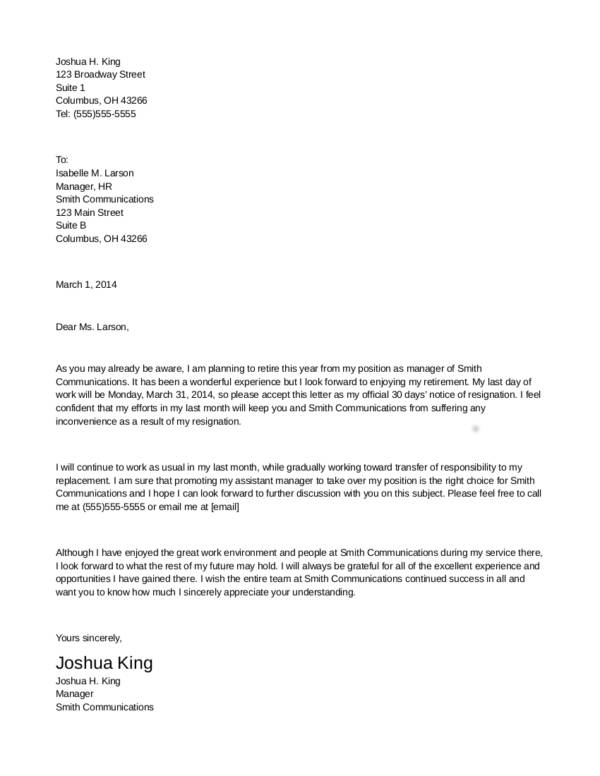Handing out a resignation letter to your employer or manager is not an easy task. You can even feel the anxiety boiling inside just thinking about giving your formal resignation letter to the person who trusted you enough to hire you as one of his/her employees. Indeed, none of us would want to disappoint our managers or employers. This is especially true for those whose experience within a company is enjoyable and rife with fun and learning.
So that you may feel a sense of comfort when handing your resignation letter, it would be of immense help to you if you are able to notify your employer or manager personally before sending your resignation letter. This is important to set the professional tone of your entire resignation process. Another thing that you must take care of when resigning is in deciding which information you need to include in your resignation letter. Now, the act of writing a resignation letter must be taken seriously. You can’t simply scribble words at the top of your head. There is a proper format and content that must be followed when writing resignation letters. That is why if you are in the process of writing one, then you need not worry any further. In this article, we are giving you a collection of tips that can help you glide through the process of writing an appropriate resignation letter with ease. Read on below, and if you wish, you may also download our resignation letter templates for your reference.
Generic Resignation Letter
Thankful Resignation Letter
30 Days Notice Period Resignation Letter
Before Writing a Resignation Letter
Below is an enumeration of the steps you need to take before sending a resignation letter. Hopefully, you are able to religiously follow these steps so that you can avoid untoward incidents and difficulties that may harm your long-term reputation as a professional.
Here are the steps:
-
Are you sure of your decision?
Before anything else, you must be able to answer this question with an absolute yes. Otherwise, if you still have doubts in your mind regarding your decision to resign, then perhaps you are not ready to resign yet. The solution to whatever reason you have for resignation may not be your departure from your job but rather, you merely need to air out your concerns to your manager or employer. If you are in doubt of your decision, then you need to reassess the situation that has given you the idea of resigning in the first place. Are you merely resigning because there’s a failure in the management? Perhaps you are resigning due to the toxicity of the work environment? You must be able to zoom in on the real reason and strive to define it in clear terms. When you are able to give a name to your work-related problems, you would find it easier to discern which course of action you need to take in order to solve it. For instance, if you have a problem with a certain company rule or policy, then you can always talk to the human resource manager and make a fact-based logical exposition of why such rule is impractical or unjust. Only when the management has expressly stated or wantonly manifested their lack of concern for your plight can you make the decision to resign. In the same way that if the level of toxicity in your work environment is still bearable, then perhaps resignation would not be warranted. Usually, if a work environment is only mildly toxic, there is still a chance that you can resolve your relational issue through a conflict management session to be spearheaded by the human resource manager or staff of your company. If you have exhausted all options that are within your reach, then that is the time that you can finally make the decision to commence the resignation process.
When you are able to give a name to your work-related problems, you would find it easier to discern which course of action you need to take in order to solve it. For instance, if you have a problem with a certain company rule or policy, then you can always talk to the human resource manager and make a fact-based logical exposition of why such rule is impractical or unjust. Only when the management has expressly stated or wantonly manifested their lack of concern for your plight can you make the decision to resign. In the same way that if the level of toxicity in your work environment is still bearable, then perhaps resignation would not be warranted. Usually, if a work environment is only mildly toxic, there is still a chance that you can resolve your relational issue through a conflict management session to be spearheaded by the human resource manager or staff of your company. If you have exhausted all options that are within your reach, then that is the time that you can finally make the decision to commence the resignation process.
-
Check your readiness in leaving your current job.
Now that you have decided to leave your job, it is not wise to jump out of your company right away. You have to be strategic when exiting from your company. For instance, are you financially able to support yourself after leaving your job? Have you applied for other jobs? Do you already have a job offer waiting for your acceptance?
-
Set up a meeting with your immediate head.
With all the abovementioned considerations properly addressed, you can then proceed to the next step, and that is to verbally notify your immediate head or manager. If you are a part of a huge department or company, make sure that you are able to request for an appointment or a brief meeting with your immediate head or with the human resource manager days ahead or at least a day before talking to them. During the meeting, remain professional. Make sure that you are able to clearly explain the necessity of your departure. When doing so, avoid oversharing. It is not your responsibility to share all the details of the reason behind your resignation. It is enough that you are able to inform your manager regarding your resignation when it takes effect and the manner you would fulfill your responsibilities in the remaining time you have with the company.
-
Avoid talking about it to your colleagues.
This is perhaps the golden rule of resignation. You must not talk about your decision to resign to your colleagues before you are able to formally notify your immediate head or manager. Indeed, if you do so, such action would be frowned upon by the human resource manager. Hence there is a likely chance that your long-term reputation as a worker would be tainted with the adjectives like “unprofessional” and “bad work ethics.” This is so because when you talk about your decision to resign (especially if it is accompanied with your complaints regarding the company), your colleagues may also become demotivated to do their jobs.
-
Be consistent when talking about the reason behind your resignation.
Nobody wants to associate themselves with liars—that is a fact. That’s why you have to make sure that the reason you told your manager behind your resignation would be the same reason you would tell your colleagues and the one that you would write on your resignation letter.
-
What are the terms of your employment contract regarding the proper method of resigning?
As a worker, you have to protect your long-term reputation and avoid any disputes or misunderstandings with your current company. That is why you have to check your employment contract and follow your company’s rules on the proper way to resign. One point that you must always check out in your employment contract is the rule about the observation of a notice period.
Do you want to gain more insightful information on how to resign from your job the right way? Browse our website for more astoundingly informative articles that can illuminate your thoughts on the proper way to tender your resignation.
Effective Immediately E-mail Resignation Letter
Basic Two-Week Resignation Letter
2-Week Resignation Letter Due to Personal Reasons
Government Position Resignation Letter
Resignation Letter with 30 Days Notice Period
Membership Resignation Letter
When Writing a Resignation Letter
The process of writing a resignation letter can be a daunting one. Even when you already have an understanding of the steps you need to take prior to writing a resignation letter, you may still find yourself stuck in a writing rut when you are actually starting to draft one. To help you ease through the process of writing a resignation letter, here are some steps you can follow:
-
Follow the proper format.
You don’t want to submit a resignation letter that looks hastily made with a format all askew, right? Remember all your efforts in keeping your reputation stellar and stately in your company despite all the pressure to do otherwise? It will certainly nullify all your efforts at remaining professional if your letter is not properly formatted. If you are drafting a resignation letter in haste, make sure that you are able to pattern it according to a standard resignation letter format. For easier reference, use the resignation letter templates that we have on this page.
-
State your intention clearly.
Your employer or manager would greatly appreciate it if you would go straight to the point in the first lines of your resignation letter. Never use superfluous language and avoid unnecessary twists and turns. In your letter’s body, start with a warm greeting then follow it with your statement of resignation. You may write it in the following manner:
“I am communicating my intention to tender my resignation that would be effective on (insert the date of effectivity).”
“I would like to tender my resignation from my job position as a (insert job position title) in your company (insert name of the company).”
“I am resigning from my job position as a (insert job position title) to be effective on the (day) of (month and year).”
You may also add some fresh spin in your introductory part by writing your notification of resignation in the following manner:
“I have thought about this matter thoroughly and I am filled with a deep regret that I must leave my job position in the company on (insert date of effectivity).”
“It is with deep regret that I must inform you of my decision to resign from our prestigious company. My resignation shall take effect on the (day) of (month and year).”
-
Be specific.
Avoid confusing your manager or employer. Give them all the facts that they need to know about your resignation letter. Tell them the specific date of your resignation. If you are offering your services during the transition period, you can then specify the length of the duration period that you plan on observing.
-
Don’t over-explain.
When stating your reason for resigning, always state an honest reason. It is enough that you are able to give them an honest reason and you don’t have to divulge all the nitty-gritty details of your resignation as it won’t be necessary. In fact, it is not your obligation to inform your manager or employer regarding the nature of your new job position, the name of the company that has hired you, and the amount of your salary. It is wise to avoid divulging such information as it may not be taken by your manager in a positive light. It may seem like a backhanded comment on how your company is inadequate or inferior as compared to the new company that has hired you. That’s why, above all else, veer away from such line of conversation. Just stick to the basics of your resignation and you will be fine!
-
Always remain polite.
It is of paramount importance that you are able to make your resignation letter polite as this is one good way for you to keep your professional relationships even after quitting your job.
-
Show gratitude.
If you have truly learned a lot of things from your company, then it is best if you are able to properly communicate your thankfulness toward your company. It’s a good idea to express your thankfulness for a number of reasons, the first being, your employer or manager would feel a sense of fulfillment upon the awareness that their actions are actually able to produce a positive effect on one of their employees. Furthermore, if you thank your employer or manager, it is more likely that they would continue doing the actions or continuing a rule or company policy that may benefit other remaining employees in the company. So in a way, you are doing your coworkers a favor by helping maintain a work environment that is conducive for their growth and learning. In line with this discussion, if you haven’t garnered enough experience within the company that would result in a myriad of learnings, then you may simply thank your employer or manager for the chance being given to you to work in their institution. Truly, no matter how short your stay may have been, there is always something that you may have gained from your work experience there. Whatever the level of learning you may have obtained from your term in the company, you have to make sure that your words of gratitude are sincere. Don’t thank your manager or employer for something that you are not truly grateful for.
-
Offer your assistance during the transition period.
When you leave your job position, you have to make sure that you are making things easier for the person who is going to replace you. Arrange all the exit documents that you have used during your term. Organize these in a systematic manner that would make it easier for your replacement to locate items that they may need during their performance of their job duties. Other than preparing all the documents, you may also volunteer to look for a replacement if your manager or employer hasn’t already found one. You may call on people whom you know to be qualified for the job position or you may post advertisements in your social media accounts. If the management has already found a replacement, you can volunteer to mentor your replacement properly. Make your employer feel a sense of relief and comfort in the fact that you are leaving your position to a person who has been duly trained and oriented on the proper way to perform his/her job functions. If your resignation is immediately effective due to some uncontrollable circumstance, then you must still try and figure out ways to offer your services as a mentor to your replacement. Make sure that you are offering your services for free. It is gravely unprofessional for you to ask for a training fee when in fact, it is your ethical duty to conduct a proper turn over with your replacement.
-
Close your letter formally.
After you have made thanked your employer or manager, it is time for you to formally end your letter with a polite remark. You may use any of the following:
- “Sincerely yours”
- “Warm regards”
- “Best regards”
- “Yours truly”
- “All the best”
- “Regards”
- “Sincerely”
Below the polite remark, affix your signature. Then sign off your complete name. If your job position is of a higher ranking, you can write the title of your position below your complete name.
Now that you know all there is to know about resignation letter-writing, go ahead and write one now! If you want to know more about writing resignation letters, you may read our website’s articles that are written with the sole purpose of catering to your needs. Browse our website and you can find some quick tips in writing resignation letters, which are fairly easy to follow.
Related Posts
Resignation Letter for Medical Samples & Templates
Letter of Intent Samples & Templates
Letter of Intent for a Job Samples & Templates
Lease Proposal Letter Samples & Templates
Letter of Inquiry Samples & Templates
Character Reference Letter Samples & Templates
Claims Letter Samples & Templates
Response Letter Sample & Templates
Follow Up Letter Samples & Templates
Sample Project Proposal Letter Templates
Donation Letter Samples & Templates
Addressing a Formal Letter Samples & Templates
Grievance Letter Samples & Templates
Sample Sponsor Thank You Letter Templates
Sample Letters of Request

